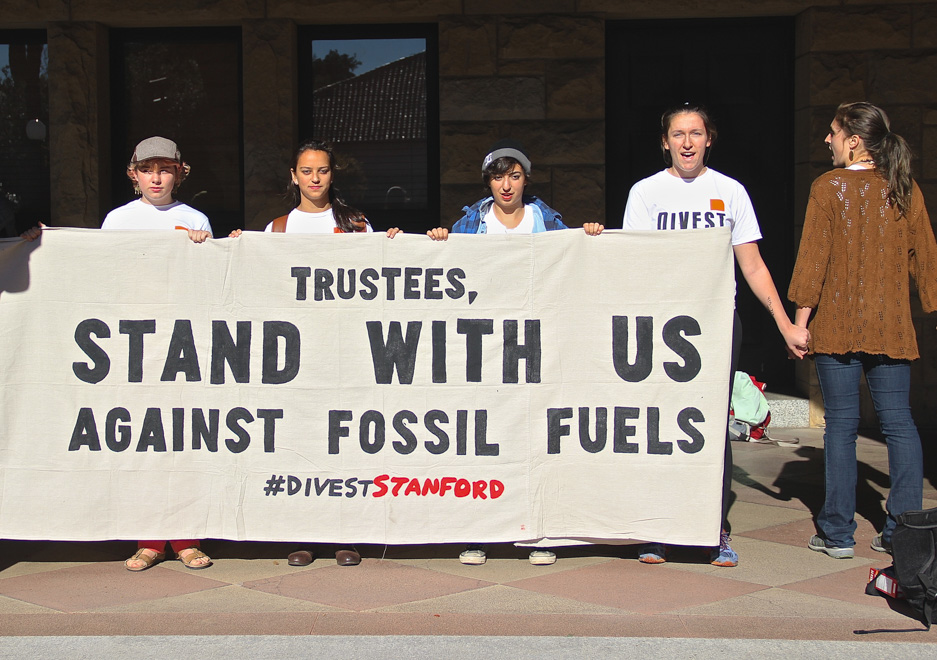Fossil Free Stanford (FFS) has initiated a petition for an ASSU amendment demanding that Stanford divest from fossil fuels.
The petition, published last week, reads: “In accordance with Stanford’s commitment to ethical investment, the University should divest its endowment from fossil fuel extraction companies in order to avert further environmental and social harm caused by climate change.”
The petition — officially called an advisory referendum — has gained 296 signatures as of Monday night, and alludes to the divestment guidelines set forth by FFS’ mission statement, which also calls on the University to freeze any new investments in the top 100 oil and gas companies, as well as divest from any direct ownership in these aforementioned companies within the next five years.
In order to make it onto voter ballots, the initiative must receive support from 5% of the undergraduate and graduate populations separately. This requires 347 undergraduate and 457 graduate signatures, according ASSU Elections Commissioner Paul Serrato ’19.
“Given the renewed focus on University investment standards at this moment, we are basically reevaluating our own divestment standards,” said FFS member Rebecca Behrens ’19.
She added that the petition comes at a critical time, as other student groups have also recently expressed concern with the University’s investment interests.
In September 2016, SU Prison Divest requested that the the Board of Trustees divest from private prison corporations. In response, the Board released a statement this past October claiming that they “are initiating a full review of the Statement on Investment Responsibility,” a policy document that articulates the Trustees’ commitment to responsible investments, as well as guidelines for fulfilling that pledge.
As such, the Board of Trustees said that they will not accept any requests for divestment for the 2017-2018 academic year while the evaluation is taking place.
In an email to The Daily, University spokesperson E.J. Miranda wrote that the Board has not received a new divestment request from FFS since its October statement.
According to Stanford News, the Board of Trustees and campus Advisory Panel on Investment Responsibility and Licensing (APIRL) are currently soliciting campus community input on the University’s investment policies and procedures via outreach campaigns and an online feedback form.
“We encourage input from the campus community to improve the policies and procedures around these issues,” Miranda wrote, in reference to the article.
The Board’s year-long hiatus from divestment requests has given FFS a chance to refocus and redefine its strategy to encourage Stanford’s fossil fuel divestment. Behrens said that while the Board of Trustees is working on making its divestment grounds more measurable, FFS is taking this time to ramp up student support and specify its goals.
The Statement on Investment Responsibility states that Trustees may divest from a company if they determine that the individual company causes more “social injury” than benefit and that divestment would not impair the University’s ability to carry out its mission.
“Currently their divestment standards are nice in principle, but really hard to actually evaluate,” Behrens said.
In a Debate Night hosted by Stanford in Government this past November, the Stanford College Republicans (SCR) engaged in a public debate with FFS on the issue of fossil fuel divestment.
SCR representative John Rice-Cameron ’20 argued that renewable energy alternatives are “simply not viable alternatives at this time.”
To challenge this claim, however, Fossil Free Stanford focused heavily on ethical investment as an efficient means to grow and sustain the Stanford endowment.
“There are a number of studies that suggest there are a multitude of ways to ethically invest and still make the same returns,” Behrens said.
She added that the idea that fossil fuel divestment will seriously harm the Stanford endowment is “an excuse not to act.”
“There are so many industries…fossil fuels are less than 10 percent of what the sector is. Through divestment, you’re reducing the variability of things you can invest in, but not so drastically that it’s going to be dangerous.”
This petition marks the latest effort by FFS to bolster its divestment campaign.
Over the past years, FFS has held numerous protest rallies and sit-ins, and has invited students and alumni to pledge to withhold all donations to Stanford until the University complies with FFS’ demands and divests from the fossil fuel industry. To date, 750 Stanford students have made this pledge.
On the future of FFS and their divestment requests, Behrens says she is hopeful.
“We’re going to be very focused on engaging the student body in the coming months,” Behrens said. “You’ll see a lot more of us going door to door and knocking, having a rally or two and really finding ways to engage with students.”
Contact Anna-Luisa Brakman at abrakman ‘at’ stanford.edu.
